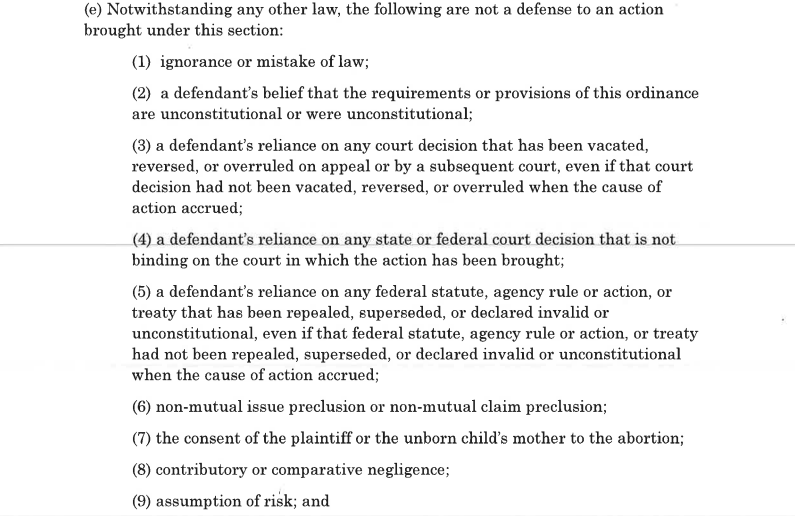Episode 3: Prop A Prevents You From Defending Yourself In Court
In this series, we're diving deep into the 18-page ordinance that’s currently threatening Amarillo’s culture, economy, and the well-being of its people. So far, we’ve covered how this will encourage neighbors to sue neighbors and encourages lawsuits without proof.
In Episode 3, we’re breaking down how this ordinance prevents you from defending yourself in court.
“This ordinance prevents you from defending yourself in court.”
“Section 8-6-8 outlines the defenses you are NOT allowed to use in court if you are sued.”
“This is HIGHLY UNUSUAL for ordinances.”
Specifically, Section (e) of the ordinance states that certain defenses will not be allowed in court if someone is sued under this ordinance. Let’s break down what this means and why it is so harmful:
1. No Defense for Honest Mistakes or Lack of Knowledge
The ordinance says that “ignorance or mistake of law” is not a defense. This means that if someone accidentally breaks this ordinance because they didn’t know about it or didn’t fully understand it, they can still be sued. This is a serious problem because laws are often complicated and hard to understand. People should not be punished for honest mistakes or for not knowing every detail of a new rule. If this ordinance passes, ordinary people could be dragged into court and held responsible for things they never intended to do.
Imagine you’re a rideshare driver living in New Mexico. You pick up a passenger who asks to be driven to a destination, which turns out to be a healthcare facility that provides abortions. Under this ordinance, even if the driver lives out-of-state, or even if you didn’t know or intend to participate in any action related to abortion, you could be sued for simply doing your job. This makes everyday activities risky and could deter people from helping others out of fear they’ll be targeted.
2. No Defense if You Believe the Ordinance is Unfair or Unconstitutional
The ordinance also says that believing the ordinance is unconstitutional or unfair is not a valid defense in court. In other words, even if someone thinks the ordinance violates basic rights protected by the Constitution, they cannot use that argument to defend themselves. This removes a basic safeguard that helps protect people from unfair laws. Everyone should have the right to argue that a law is unconstitutional, especially when it comes to personal freedoms and rights.
This isn’t just theoretical—it’s already happening. In states like Texas with similar ordinances, many legal experts and organizations argue that these laws violate constitutional rights, particularly the right to travel and seek medical care. Yet, this ordinance strips away your right to even raise that defense. A doctor providing necessary medical care in a life-threatening situation could be sued and would have no defense, even if they believed the ordinance was against the Constitution.
3. No Defense Based on Past Court Decisions
Another dangerous part of this section of the ordinance is that it does not allow someone to defend themselves by saying they relied on a court decision that has since been changed or overturned. Court rulings can sometimes be reversed or updated as laws change or as higher courts make new decisions. If someone acted based on what was legal according to a court decision at the time, they should not be punished if that decision is later reversed. However, this ordinance says they can still be sued even if they were following the law as it was understood at the time. This creates a lot of confusion and uncertainty for people who are just trying to follow the law.
4. No Protection from Being Sued Multiple Times for the Same Issue
The ordinance also mentions "non-mutual issue preclusion" and "non-mutual claim preclusion." These legal terms mean that even if you have already been sued or taken to court once for something, you could still be sued again by someone else for the same issue. Normally, once a court has made a decision, you can't be sued again for the same thing by a different person. This protection is meant to prevent people from facing endless lawsuits over the same matter. But under this ordinance, that protection is removed. This means people could be dragged into court over and over again for the same situation, causing even more stress, time, and money spent on legal battles.
One of the biggest issues with Prop A is how it could open the floodgates for lawsuits. For instance, a clinic that provides reproductive health services could be sued by multiple individuals, even if they’ve already gone through a legal process for the same issue. This can bankrupt small businesses or force organizations to shut down due to the constant legal threats.
These rules would create a climate of fear and confusion. People would be afraid to speak out, share information, or help others because they could be sued with almost no way to defend themselves. This discourages community support and open discussion, which are vital for a healthy, thriving community. It could lead to people avoiding certain actions or topics altogether out of fear of being taken to court.
The best thing about Amarillo is our ability to come together to help each other through anything. We fear that if Prop A is approved, the fabric of our community as we know it will be tattered.
Visit us back here next week as we tackle another aspect of this legislation. For more detailed information and find out how you can get involved in opposing this harmful ordinance. Together, we can educate our community from the divisive and damaging effects of this law.

